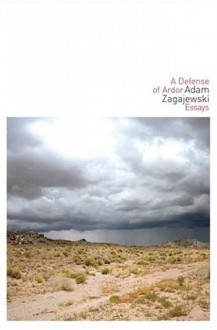Ardor, inspiration, the soul, the sublime: Such terms have long since fallen from favor among critics and artists alike. In his new collection of essays, Adam Zagajewski continues his efforts to reclaim for art not just the terms but the scanted spiritual dimension of modern human existence that...
show more
Ardor, inspiration, the soul, the sublime: Such terms have long since fallen from favor among critics and artists alike. In his new collection of essays, Adam Zagajewski continues his efforts to reclaim for art not just the terms but the scanted spiritual dimension of modern human existence that they stake out. Bringing gravity and grace to his meditations on art, society, and history, Zagajewski wears his erudition lightly, with a disarming blend of modesty and humor. His topics range from autobiography (his first visit to a post-Soviet Lvov after childhood exile; his illicit readings of Nietzsche in Communist Poland); to considerations of artist friends past and present (Zbigniew Herbert, Czeslaw Milosz); to intellectual and psychological portraits of cities he has known, east and west; to a dazzling thumbnail sketch of postwar Polish poetry.Zagajewski gives an account of the place of art in the modern age that distinguishes his self-proclaimed liberal vision from the “right-wing radicalism” of such modernist precursors as Eliot or Yeats. The same mixture of ardor and compassion that marks Zagajewski’s distinctive contribution to modern poetry runs throughout this eloquent, engaging collection. Adam Zagajewski was born in Lvov, Poland, in 1945. He lives in Krakow and spends part of the year teaching at the University of Houston. He was awarded the 2004 Neustadt International Prize for Literature. Ardor, inspiration, the soul, the sublime: such terms have long since fallen from favor among critics and artists alike. In his new collection of essays, Adam Zagajewski continues his efforts to reclaim for art not just the terms but the scanted spiritual dimension of modern human existence that they describe. Bringing gravity and grace to his meditations on art, society, and history, Zagajewski wears his erudition lightly, with a disarming blend of modesty and humor. His topics range from autobiography (his first visit to post-Soviet Lvov after childhood exile; his illicit readings of Nietzsche in Communist Poland); to considerations of artist friends past and present (Zbigniew Herbert, Czeslaw Milosz); to intellectual and psychological portraits of cities he has known, east and west; to a dazzling thumbnail sketch of postwar Polish poetry. Zagajewski gives an account of the place of art in the modern age that distinguishes his self-proclaimed liberal vision from the "right-wing radicalism" of such modernist precursors as Eliot or Yeats. The same mixture of ardor and compassion that marks Zagajewski's distinctive contribution to modern poetry runs throughout this eloquent, engaging collection. "[Zagajewski is] one of the most appealing and deeply civilized poets of our time."—Adam Kirsch, The New York Sun "Zagajewski so deftly attends to the intractable complexity of human nature precisely because he offers insights that clarify contradictions without attempting to resolve them. He writes of death, love, power and abuse, longing, joy, sorrow, and despair, and does so with a sense of intimacy that is not limited by the personal . . . Zagajewski's poetry is elegant, accomplished, and among the best writing coming out of Europe today. Yet it should not overshadow his prose. His essays offer insight into a refined poetic sensibility and a rigorous moral intelligence at work. A poet's passion for language is evident on his every page."—Tess Lewis, The Hudson Review "The 14 essays that make up poet Zagajewski's 'defense' are an engagingly warm and witty blend of literary comment and memoir, passionate about aesthetic matters but refreshingly free of personal rancor. Zagajewski was born in Poland at the end of WWII; his career is inexorably bound up with the fate of his homeland, and his essays are full of the critical but fierce patriotism common to the country often wryly called 'God's playground.' Zagajewski's combination of the personal, literary, and political is canny and well-judged, as in the excellent 'Nietzsche in Krakow,' which begins as partly nostalgic reminiscence, tracing the author's furtive discovery, as an adolescent living under communism, of the officially proscribed 'mustachioed philosopher' and his delight in 'the scorn with which this philologist and philosopher treated the state.' But this remembrance of youthful enthusiasm underlies a more skeptical view, in which Nietzsche's disdain for objective truth and worship of irrationality are seen to underlie not only fascism but, through Lenin, the state socialism of postwar Poland . . . In other essays, the careers of such friends and luminaries as Czeslaw Milosz and Zbigniew Herbert are contextualized with both intelligence and affection, as are cities in which Zagajewski has lived, written, and taught."—Publishers Weekly
show less

